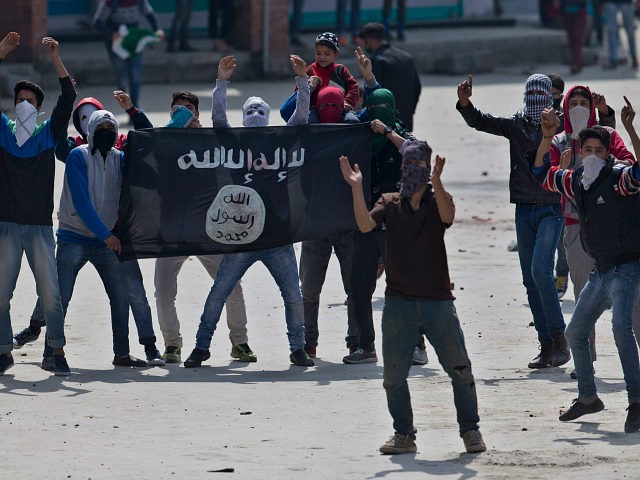The Islamic State (ISIS/ISIL) and its alleged rival al-Qaeda are expanding their Sunni jihadi operations into the disputed Muslim-majority Himalayan region of Kashmir, claimed by Pakistan, India, and China, according to a report published Wednesday.
Citing unnamed New Delhi intelligence officials, the India-based daily newspaper Mint suggests that ISIS and al-Qaeda are working together in Kashmir, echoing other assessments.
“The Al-Qaeda lost all ground after Osama bin Laden was killed. So the group has almost been razed to the ground. Any operations they now conduct in Kashmir or elsewhere will be in conjunction with the Islamic State. While the groups have been trying to get a foothold for a while now, we need to keep a hawk’s eye on any change of trend in warfare in the valley,” an Indian intelligence officer told Mint, which is affiliated with the U.S.-based Wall Street Journal (WSJ), on condition of anonymity.
Some analysts believe that ISIS and al-Qaeda have indeed collaborated.
In Afghanistan, ISIS has been accused of working with Taliban jihadists who are strong al-Qaeda allies.
A number of experts have forecasted that, should ISIS be defeated, al-Qaeda would incorporate the remnants of the terrorist organization.
Late last month, al-Qaeda named Zakir Musa as chief of its newly created cell in Kashmir.
“The appointment of Zakir Musa as head of the new group represents the first time militants linked to al-Qaida have operated openly in Kashmir, site of a decades-long separatist insurgency and the only Muslim-majority region under Indian control,” reported the Guardian.
“The new cell, named Ansar Ghawzat-Ul-Hind, is the deepest inroad al-Qaida has yet made in Kashmir. A 2014 video called on ‘brothers’ there to wage jihad against Indian authorities,” the news outlet added.
Musa has reportedly advocated that his fight in Kashmir is aimed at establishing a caliphate.
Despite the unprecedented inroads ISIS and al-Qaeda have made into Kashmir, Indian defense experts have dismissed the claim that the security situation in the region is deteriorating.
“The Al-Qaeda is almost absent and the Islamic State is also on its way out. The bulk of terror activity in Kashmir is carried out by Punjabi Muslims who are sponsored by Pakistan. The Islamic State or Al-Qaeda will not find supporters for their cause who will finance them,” H.S. Panag, a former Indian army officer and defense expert, told Mint.
In an edition of its propaganda magazine Dabiq published in early 2016, ISIS revealed that it was committed to “expanding” into Kashmir.
“It is already known that the Islamic State has made inroads into Kashmir. However, in the next one or two years militancy in Kashmir will change to hardcore radicalization of the youth with these groups of militants aiming at internationalizing the Kashmir issue,” an anonymous Indian senior intelligence officer told Mint.
For months, Indian authorities have been warning against the jihadist group’s presence and threat in Kashmir.
“In the next 2-3 years, militancy in Kashmir will change to hardcore radicalization of youth, as Al-Qaeda and Islamic State are aiming to take the Kashmir issue international,” notes Mint, adding, “[Indian] intelligence units in the [Kashmir] state claim that emergent Islamic State factions will soon dominate the valley.”
The Pakistan-linked jihadist groups known as Lashkar-e-Taiba (LeT) and Hizbul Mujahideen have been leading terrorist activities in Kashmir for years, engaging local security forces in firefights.
“While the LeT and the Hizbul’s signature moves have been to engage security forces in gun battles, the Islamic State and the Al-Qaeda conduct large scale IED (improvised explosive devices) blasts and suicide missions,” reveals Mint.
India, Pakistan, and China have competing claims to Kashmir, but China has largely stayed in the shadows of disputes between nuclear-armed rivals India and Pakistan over the region.
Nevertheless, China, which is stronger than India and Pakistan, has flexed its muscle, threatening to enter the Kashmir fray.
An editorial published by China’s state-run Global Times this year urged Beijing to interfere in the “turbulent” Kashmir dispute, suggesting, “If New Delhi chooses to play dirty, however, Beijing should not hesitate to answer blows with blows.”
China has long backed Pakistan in its rivalry with India. Both China and its ally Pakistan consider India to be their regional competitor.
New Delhi has long accused Islamabad of backing Islamic terrorists in Kashmir who are fighting for independence from India or in favor of a merger with Pakistan, a charge that Islamabad denies.
Meanwhile, Pakistan often accuses New Delhi of human rights violations — namely cracking down on dissent in India-held Kashmir, a claim that New Delhi denies.

COMMENTS
Please let us know if you're having issues with commenting.